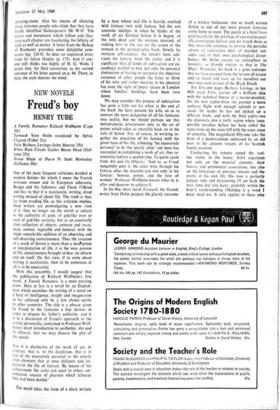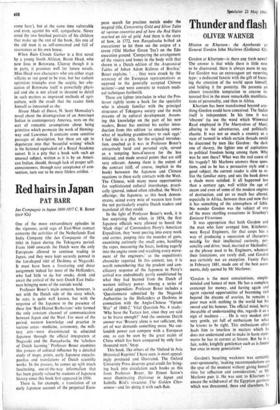NEW NOVELS
Freud's boy
HENRY TUBE
A Family Romance Richard Wollheim (Cape 30s) Termush Sven Holm translated by Sylvia Clayton (Faber 21s) Felix Barbara Levinge (John Murray 25s) When Rain Clouds Gather Bessie Head (Gol- lancz 25s) House Made of Dawn N. Scott Momaday (Gollancz 300_ One of the most frequent criticisms levelled at modern fiction—by which I mean the French nouveau roman and its European adherents, Borges and his followers and Flann O'Brien and his—is that it is narcissistic, writing about writing instead of about life. The truth is that, far from evading life, as this criticism implies, these writers are promulgating a new view of it; they no longer see the world as subject to the authority of gods, of god-like men or even of god-like societies, but as an essentially alien collection of objects, animate and inani- mate, animal, vegetable and mineral, with the single remarkable addition of an observing and self-observing consciousness. Thus the creation of a work of fiction is more than a deseliption or interpretation of life, it is the very process of life, consciousness brought to bear on objects and on itself. On this view, if to write about writing is narcissistic, then to be conscious at all is to be narcissistic.
With this preamble, I would suggest that the publication of Richard Wollheim's first novel, A Family Romance, is a most exciting event. Here at last is a novel by an English- man which examines the writing of a novel on a level of intelligence, insight and imagination so far achieved only by a few choice spirits in other countries. The title is a phrase given by Freud to the fantasies a boy devises in order to dispute his father's authority. and it is in a discussion of Freud's approach to the artistic personality, contained in Professor Woll- heim's short introduction to aesthetics. Art and Its Objects, that we may discern the plot of this novel:
`For it is distinctive of the work of art, in contrast, that is, to the daydream, that it is free of the excessively personal or the utterly alien elements that at once disfigure and im- poverish the life of fantasy. By means of his achievement the artist can open to others un- conscious sources of pleasure which hitherto they had been denied.'
The novel takes the form of a diary written by a man whose real life is heavily overlaid with fantasy---not wild fantasy, but the sort someone indulges in when he thinks of the work of art finished before it is begun, of the wife dead and the mistress married, of making love to the star on the screen or the woman in the pornographic book. Slowly, by intricate self-analysis, the novel's hero sub- tracts the fantasy from the reality and it is significant that all kinds of subtraction are ex- ceedingly painful to him, not only the personal diminution of having to recognise the objective existence of other people (he hates to think of his wife and father meeting in his absence) but even the sight of empty spaces in London where familiar buildings have been torn down.
We may consider this process of subtraction has gone a little too far when at the end of the book the hero poisons his wife, so as to convert the most dangerous of all his fantasies into reality. -but we- should- perhaps see this melodramatic denouement only as the set of points which takes us smoothly back on to the rails of fiction. For, of course, in. working to- gether the situations of his fantasy with the given facts of his life, trimming 'the excessively personal' to fit 'the utterly alien,' our hero has succeeded in completing a work of art, thus re- nouncing fantasy a second time. To quote again from Art and Its Objects: 'And so, as Freud sanguinely puts it, the artist wins through his fantasy what the neurotic can win only in his fantasy : honour, power, and the love of women.' Professor Wollheim knows what he is after and deserves to achieve it.
In his fine short novel Termush, the Danish writer Sven Holm projects the ghastly outcome of a nuclear holocaust—not so much science fiction as one of our most present fantasies come home to roost. The guests at a hotel have paid heavily for the privilege of survival in speci- ally constructed shelters and we watch them as they miserably continue to survive the periodic
advent of radioactive dust, of maimed out- siders and of their own psychological distur- bances. Mr Holm creates an atmosphere as hermetic, as blandly sinister as that in The Magic Mountain; his book is a grim reminder that we have escaped from the terrors of nature only to invent and store up for ourselves our own improved version of the Black Death.
For fifty-one pages Barbara Levinge, in her-
fifth novel Felix, carries off a brilliant idea with the technical finesse of a master-novelist; for the next eighty-three she pursues a more
ordinary flight with enough aplomb to per- suade the reader he has not picked up a
different book; and with the final eighty-two
she plummets into a twilit region where innu- merable novelists before her have rolled the same stone up the same hill with the same sense of unreality. The magnificent fifty-one take the form of a memorandum addressed by an old man to the autumn tenants of his Scottish family mansion.
Conducting his tenants round the vari- ous rooms in the house, Felix expatiates
not only on the material contents, their
history and sentimental associations, but also on the behaviour of previous tenants and the events of his own life. His tone is perfectly judged, rude and threatening CI am back the very same day you leave; probably within the hour'), condescending efloliday is a word I never need use. It only applies to those who
come here'), but at the same time vulnerable and even, against his will, sympathetic. Never mind the two botched portraits of his children that make up the rest of the book, this one of the old man is as self-contained and full of resonances as his own house.
When Rain Clouds Gather is a first novel by a young South African, Bessie Head, who now lives in Botswana. Clumsy though it is in parts, it promises well for future novels. Miss Head uses characters who are either stage villains or too good to be true, but her radiant optimism triumphs over the sceptic, her eio- cation of Botswana itself is powerfully physi- cal and she is not afraid to descend to detail in such matters as improved methods of agri- culture, with the result that the reader finds himself as interested as she.
House Made of Dawn, N. Scott Momaday's novel about the disintegration of an American Indian in contemporary America, rests on the sort of romantic assumptions about being primitive which permeate the work of Heming- way and Lawrence. It contains some sensitive passages of description, but these are apt to degenerate into that 'beautiful writing' which is the fictional equivalent of a Royal Academy sunset. It is a pity that a book with such an unusual subject, written as it is by an Ameri- can Indian, should, through lack of proper self- consciousness, through easy acceptance of con- vention, turn out to be mere lifeless artifice.







































 Previous page
Previous page